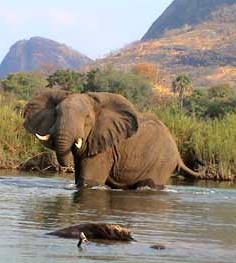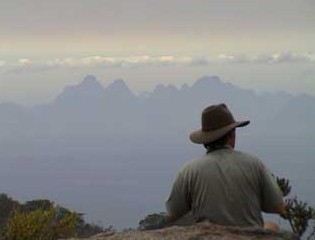|
Mozambique Travel - Leisure | Environment - Nature Northern Mozambique becomes "charter" destination
Run-down dirt roads pass through a vast landscape of open savannas, seemingly depopulated and a wilderness untouched by human hands. Still, there are hundreds of kilometres before the Niassa Reserve - the real wilderness - turns up in little contrast to the surrounding landscapes of northern Mozambique.
- As well as luxury tented camps, Twinspot has set up self-drive camping, wilderness walking and canoeing with campsites set out along the river along with self-guiding routes, the company explains its concept. "This opens the area to both self-catering overland options and exclusive luxury tourism," Twinspot adds. The organised travels generally take off from London. The sights in the Reserve are of great variation, though relatively typical to Africa's southern and eastern savannah and woodland environment. While the landscape is everything from flat to hilly, nothing close to spectacular, the main attraction is the pristine estate of the environment. There are not wheel tracks and other tourists wherever you turn around and the Reserve looks and feels like it has done for thousands of years. But the Reserve's wildlife is of course its best sales argument. An aerial census carried out in October 2002, put the elephant population at 12,000 individuals. Along with the elephants, Niassa hosts a number of endemic sub-species, notably Johnson's Wildebeest and Bohm's Zebra. Also the birdlife is outstanding, taking advantage of the different eco-types in the reserve. This variation in ecosystems and its biodiversity and untouchedness were the original reasons for protecting the large area. The Niassa Reserve shifts between open savannah, wetlands and the characteristic Miombo woodland ecosystem - a low productivity woodland occurring on poor soils. These ecological variations - a total of 21 vegetation types have been registered in the Reserve - secure a high biodiversity. Given the intact but fragile environmental resources in the Reserve, the local management authorities have opted for a soft, ecologically sensitive kind of tourism. During the last few years, the management has invited several experienced and successful tourism operators "to provide advice on the potential of Niassa Reserve for development of ecotourism." - The general consensus is that ecotourism development in Niassa is going to be a very slow and difficult process at the beginning, they conclude. Although ecotourism will be slow to develop initially, however "the longer-term prospects are much brighter," the park management maintains. Meanwhile, it is still time to experience the Niassa Reserve as a pioneer tourist in its most pristine state. By Rainer Chr. Hennig © afrol News - Create an e-mail alert for Mozambique news - Create an e-mail alert for Travel - Leisure news - Create an e-mail alert for Environment - Nature news
On the Afrol News front page now
|
front page
| news
| countries
| archive
| currencies
| news alerts login
| about afrol News
| contact
| advertise
| español
©
afrol News.
Reproducing or buying afrol News' articles.
You can contact us at mail@afrol.com









